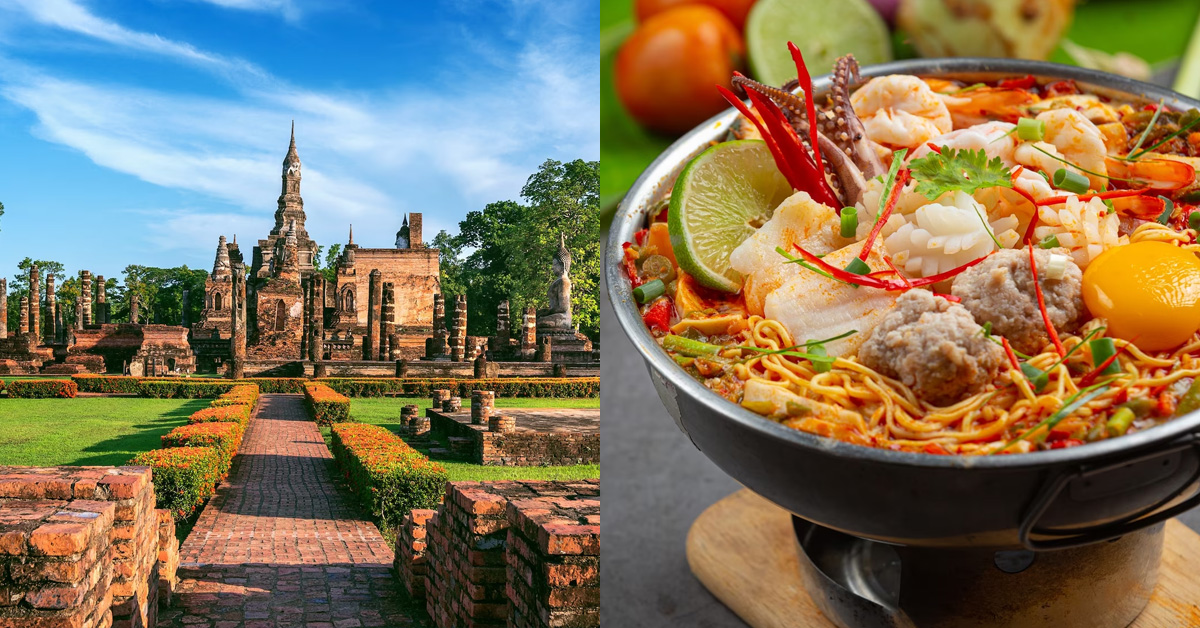Halal Thai food and cuisine is a unique blend of flavours, spices, and textures that has captured people’s hearts and taste buds worldwide. Known for its bold and vibrant flavours, Thai food perfectly balances sweet, sour, salty, and spicy.
The cuisine is heavily influenced by the country’s geography, history, and culture, and is characterized by the use of fresh herbs, spices, and vegetables. From the famous Pad Thai to the spicy Tom Yum soup, Thai food is a culinary adventure that is sure to leave you wanting more.
Halal Thai food and cuisine
Is Thai food halal?
Not all Thai food is halal as some dishes may contain non-halal ingredients such as pork or alcohol. However, there are many halal Thai restaurants and halal versions of popular Thai dishes available.
It is important to check with the restaurant or read the ingredients carefully before consuming any Thai food.
What kind of food do Thai eat?
Thai cuisine is known for its bold and spicy flavors and its use of fresh herbs and vegetables. Some popular Thai dishes include:
- Pad Thai – stir-fried rice noodles with vegetables, peanuts, and a sweet and sour sauce
- Tom Yum Soup – a spicy and sour soup with shrimp, lemongrass, and chili peppers
- Green Curry – a spicy curry made with coconut milk, green chili peppers, and vegetables or meat
- Massaman Curry – a milder curry made with potatoes, peanuts, and meat or vegetables
- Som Tam – a spicy and sour salad made with shredded green papaya, tomatoes, and chili peppers
- Khao Pad – fried rice with vegetables, meat, and sometimes egg
- Satay – grilled meat skewers served with a peanut sauce
- Mango Sticky Rice – a sweet dessert made with sticky rice, coconut milk, and fresh mango.
How can you tell if the food is halal in Thailand?
In Thailand, halal food is usually labeled with a halal certification logo or symbol. The Central Islamic Council of Thailand is the main organization responsible for certifying halal food in Thailand.
You can also look for restaurants that advertise themselves as halal or Muslim-friendly. You can ask the restaurant staff if the food is halal or if they have a halal certification.
Is it hard to find halal food in Thailand?
Thailand is a predominantly Buddhist country, and halal food is not as widely available as in Muslim-majority countries. However, there are many halal restaurants and food stalls in major cities like Bangkok, Phuket, and Chiang Mai, especially in areas with a significant Muslim population.
It is also possible to find halal food in some supermarkets and convenience stores. It is recommended to do some research and ask locals for recommendations to find halal food in Thailand.
Is Thai food healthy?
Thai food can be healthy, but it depends on the specific dishes and ingredients used. Many Thai dishes are made with fresh vegetables, herbs, and spices, which can provide a range of nutrients and health benefits.
However, some Thai dishes may be high in sodium, sugar, and unhealthy fats. It is important to choose dishes that are made with lean proteins, whole grains, and plenty of vegetables, and to limit fried and heavily sauced dishes. Portion control is important, as many Thai dishes can be high in calories.
What is Thai food similar to?
Thai food is similar to other Southeast Asian cuisines such as Vietnamese, Cambodian, and Laotian cuisine. It also shares some similarities with Indian and Chinese cuisine.
Steps to find halal food in Thailand
Here are some tips to find halal food in Thailand:
- Research halal food options in Thailand: Start by researching halal food options in Thailand. You can use online resources such as HalalTrip, Zabihah, and HalalNavi to find halal restaurants and food options in Thailand.
- Check for halal certification: Once you have identified halal food options, check if they have halal certification. Halal certification ensures that the food is prepared according to Islamic dietary laws.
- Ask locals: Ask locals for recommendations on halal food options. They may be able to suggest halal restaurants or food stalls that are not listed online.
- Look for Muslim communities: Look for Muslim communities in Thailand as they are likely to have halal food options. You can also visit mosques and ask for recommendations.
- Check the ingredients: If you are unsure about the halal status of a particular food item, check the ingredients. Avoid food items that contain non-halal ingredients such as pork, alcohol, and gelatin.
- Be cautious when eating street food: Street food is popular in Thailand, but it can be challenging to find halal options. Be cautious when eating street food and ask the vendor about the ingredients.
- Consider cooking your food: If you are unable to find halal food options, consider cooking your food. You can buy halal meat and ingredients from supermarkets and prepare your meals.

